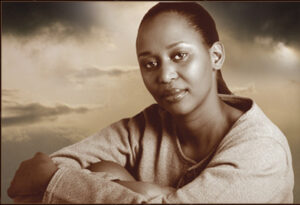Immaculée Ilibagiza: I Danced in the Air

I would say that I am a Christian, because I belive deeply in the teachings of Jesus. But I have trouble associating with the various sects of the Christian religion, because I am wary of organizations that have a record of burning people alive, however long ago it may be.
Furthermore, I base my beliefs on the Gospel of Mark (except Mark 13, which is a rewrite by who knows who), the only reliable record of Jesus’ teachings, which makes no mention of His being born of a virgin or the three kings, or for that matter, His ascension into heaven.
The Gospel of Mark, the only gospel that was written by someone who knew Jesus, begins with His baptism by John the Baptist and ends with the empty tomb. But it’s plenty for me.
I find it curious that people pay so much attention to how He got here and how He left, instead of what He said. I suppose worshipping Him is easier than trying to understand what He was trying to teach us.
Nowhere in all my literary and historical ramblings have I ever seen Jesus’ simple, divine, life-changing message so clearly and beautifully expressed as in the writing of Immaculée Ilibagiza, a survivor of the Rwandan genocide.
I read an excerpt of her book in a copy of Ode Magazine several years ago, and ever since I’ve been trying to figure out how to do it justice within the limits of a blog entry.
I truly hope that if you are a Christian, or if you are not, or if you’re not sure, you will, in any case, read her book Left to Tell.
Immaculée hid for 91 days in a walled-off bathroom in the house of a minister while the Hutu hunters roamed the countryside with machetes. One of her Hutu neighbors had killed her mother and her brother and wanted to kill her, too, so he could take her family’s farm.
The killers were searching the minister’s house when the neighbor called out her name, on the other side of the plaster wall. “I have killed 399 cockroaches today,” he boasted happily. “Immaculée will make 400. It’s a good number to kill.”
“I felt faint,” she writes. “Consciousness slipped away from me until the killers’ thundering voices were only a soft distant rumble. Then I was sleeping.”
“I floated like a feather above the other women. I saw them trembling below me on the floor. I looked up and saw Jesus hovering above me in a pool of golden light, and his arms were reaching toward me.
“I smiled, and the constant aches and pains that had become part of my body after weeks of crouching in this tiny bathroom disappeared. There was no hunger, no thirst and no fear.”
She saw a brilliant cross on the door of the bathroom, and proclaimed to the other women that they were safe at last.
“The killers had left the house,” she writes. “I heard them singing as they walked away.” Note how happy and festive the killers are!
She goes with friends to bury her mother and brother and finds they have been cut in pieces and scattered about in a sickening display of human depravity.
As she tried to go on with her life, she writes, “I couldn’t shake the crippling sorrow that seized my heart whenever I envisioned how they’d been killed.”
In answer to her prayers, she says, God sent her a dream:
“Suddenly I was with my family again high above in the clouds. The dream was so real that I reached out and felt the warmth of their skin, the gentleness of their touch; I was so happy that I danced in the air.
“Damascene [Immaculée’s brother] was wearing a crisp white shirt and blue trousers. He looked at me with a joyful glow and gave me his brilliant smile. My mother, father and Vianney [her sister] stood behind him holding hands and beaming at me.
“‘ Hey Immaculée, it’s good to see that we can still make you happy,’ my brother said. ‘You’ve been gloomy far too long and must stop all this crying. Look at the wonderful place we’re in… can you see how happy we are?
“‘If you continue to believe that we’re suffering, you’ll force us to return to the pain we’ve left behind…'”
When order is restored, the magistrate brings the wretched neighbor, Felicien, to Immaculée.
“‘After he killed Damascene and Rose [Immaculée’s mother] he wanted you dead so he could take over your property, didn’t you, pig!’
“‘What do you have to say to her? What do you have to say to Immaculée?’
“Felicien was sobbing. He looked up at me for only a moment, but our eyes met. I reached out, touched his hands lightly, and quietly said what I’d come to say, ‘I forgive you.’
The magistrate pushes Felicien out into the courtyard and asks, ‘What was that all about, Immaculée? That was the man who murdered your family. I brought him to you to question… to spit on if you wanted to. But you forgave him! How could you do that?’
“I answered with the truth, ‘Forgiveness is all I have to offer.'”

June 22, 2010 @ 12:47 am
This is an amazing post. Thanks for sharing.
June 22, 2010 @ 11:27 am
Thanks, Mridula. I’m glad you liked it.
November 29, 2010 @ 11:01 pm
Wow, very touching story, she is a real strong woman. God is great!
March 3, 2011 @ 7:46 pm
Immacul’ee is a wonderful and blesses woman. I had the pleasure of meeting her at her retreat in New Orleans. I’m encouraged by her story and every day I pray for God’s mercy in my life and in the world.